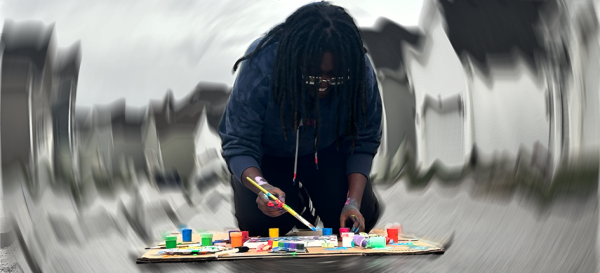The problematic pledge: A student’s perspective
In American high schools, students stand in silence every morning. They are supposed to be reciting the “Pledge of Allegiance,” but most students don’t. Whether that’s because of embarrassment, distaste or another reason, students merely just stand. Some students don’t even do that. Can we blame them?
When I stand for the Pledge of Allegiance, I become frustrated and confused. I don’t want to stand and pledge my allegiance to a country I don’t feel safe in. Yes, we are mostly safe from wars here. However, as a woman and a student, I feel unsafe. I can’t go for a run with both earbuds because I don’t know if I’ll be attacked. I can’t count on my fundamental rights regarding my own body to be safe. I can’t wear what I want because “men will be distracted.” I can’t go to school feeling safe because there aren’t enough gun laws. So why should I stand and pledge my allegiance to a country that will not protect me or my rights?
The “Pledge of Allegiance” has to be said by law in all schools in the state of Illinois. It is said to “instill a sense of patriotism” in the youth. My question is: why can we “instill a sense of patriotism,” but we can’t teach children about the LGBTQIA+ community? Children are being forced into patriotism at such a young age, and they don’t even understand it. We hammer the Pledge into every child whether they believe in the God that we supposedly hold our nation under or not.
This brings up another problem. Atheists, who don’t believe in a religion, are forced to say the Pledge still, which is a violation of the separation of church and state. Legally, schools are not allowed to force religious domination on children. In 2004, a lawsuit was filed in California citing that there was a First Amendment right violation by the Pledge including the phrase “under God.” This court case failed because it was found that the parent who filed it did not have legal custody over his child. So, we continue to say the Pledge.
Another phrase in the Pledge is also problematic. We end the Pledge by saying “with liberty and justice for all.” I can’t help but feel like this statement isn’t true. Liberty is defined as freedom from oppression from an authority, and justice is defined as fair and equal treatment. Neither of these statements hold true in present-day America. In America, minorities are being treated unfairly, whether it’s the constant killings of African Americans by our own law enforcement, taking away a woman’s right to her own body or taking away the right for transgender people to be able to transition and live their authentic life.
The history of the Pledge of Allegiance is troubling, to say the least. It was originally written and published in a magazine in 1892 to celebrate the 400th anniversary of Christopher Columbus’ voyage to America – the same Christopher Columbus who we stopped celebrating because he was a mass murderer of Native Americans. Adding on to the questionable history of the Pledge, we didn’t always hold our hands over our hearts when reciting it. Up until WWII, people would salute the flag with a salute that resembled that of the Nazi Party. In 1954, the government decided to add the phrase “under God” to differentiate the United States from the Soviet Union, which was an atheist state.
Why are we having children recite something that in the past has been identified as having resemblances to both the Nazi Party and the Soviet Union? Both of these political dictatorships caused much harm to innocent humans and both almost destroyed the world as we know it.
Students haven’t been aware of the fact that they aren’t legally obligated to say the Pledge. If we force them to say it, we should at least educate them on the fact that they have rights and the freedom of speech. We, as students, deserve to know that we have the freedom to refuse to recite something that we don’t agree with.

Name: Sophie Thill
Position: Editor-in-Chief of Web
Graduation year: 2025
A few sentences about me: I love anything...






